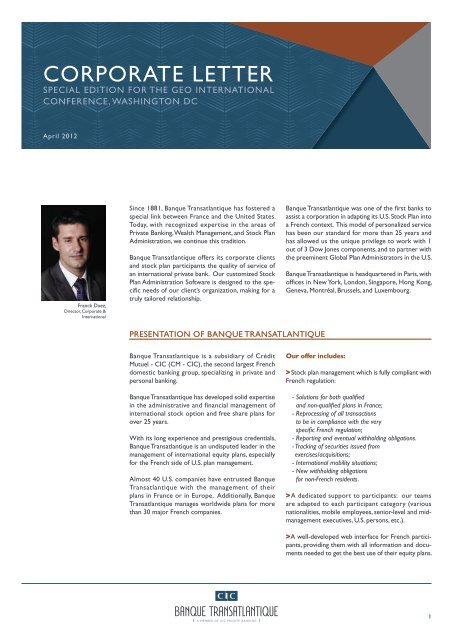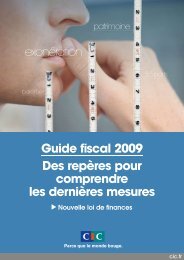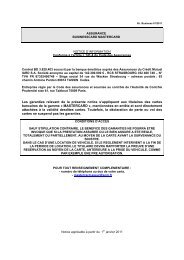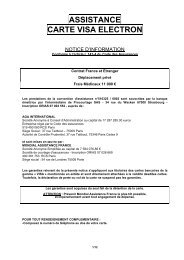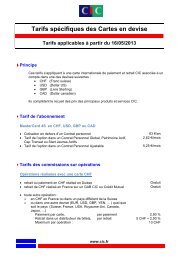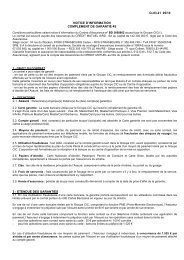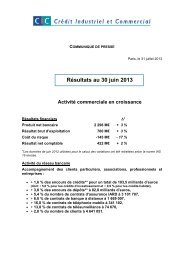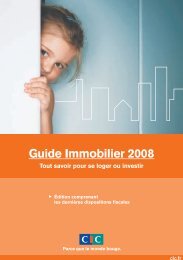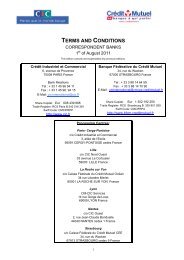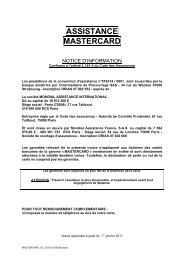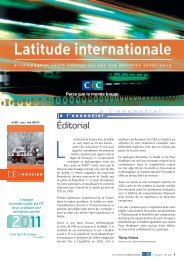April 2012 - Transatplan Corporate - CIC
April 2012 - Transatplan Corporate - CIC
April 2012 - Transatplan Corporate - CIC
You also want an ePaper? Increase the reach of your titles
YUMPU automatically turns print PDFs into web optimized ePapers that Google loves.
CORPORATE LETTERSPECIAL EDITION FOR THE GEO INTERNATIONALCONFERENCE, WASHINGTON DC<strong>April</strong> <strong>2012</strong>Franck Duez,Director, <strong>Corporate</strong> &InternationalSince 1881, Banque Transatlantique has fostered aspecial link between France and the United States.Today, with recognized expertise in the areas ofPrivate Banking, Wealth Management, and Stock PlanAdministration, we continue this tradition.Banque Transatlantique offers its corporate clientsand stock plan participants the quality of service ofan international private bank. Our customized StockPlan Administration Software is designed to the specificneeds of our client’s organization, making for atruly tailored relationship.Banque Transatlantique was one of the first banks toassist a corporation in adapting its U.S. Stock Plan intoa French context. This model of personalized servicehas been our standard for more than 25 years andhas allowed us the unique privilege to work with 1out of 3 Dow Jones components, and to partner withthe preeminent Global Plan Administrators in the U.S.Banque Transatlantique is headquartered in Paris, withoffices in New York, London, Singapore, Hong Kong,Geneva, Montréal, Brussels, and Luxembourg.PRESENTATION OF BANQUE TRANSATLANTIQUEBanque Transatlantique is a subsidiary of CréditMutuel - <strong>CIC</strong> (CM - <strong>CIC</strong>), the second largest Frenchdomestic banking group, specializing in private andpersonal banking.Banque Transatlantique has developed solid expertisein the administrative and financial management ofinternational stock option and free share plans forover 25 years.With its long experience and prestigious credentials,Banque Transatlantique is an undisputed leader in themanagement of international equity plans, especiallyfor the French side of U.S. plan management.Almost 40 U.S. companies have entrusted BanqueTransatlantique with the management of theirplans in France or in Europe. Additionally, BanqueTransatlantique manages worldwide plans for morethan 30 major French companies.Our offer includes:> Stock plan management which is fully compliant withFrench regulation:- Solutions for both qualifiedand non-qualified plans in France;- Reprocessing of all transactionsto be in compliance with the veryspecific French regulation;- Reporting and eventual withholding obligations.- Tracking of securities issued fromexercises/acquisitions;- International mobility situations;- New withholding obligationsfor non-French residents.> A dedicated support to participants: our teamsare adapted to each participant category (variousnationalities, mobile employees, senior-level and midmanagementexecutives, U.S. persons, etc.).> A well-developed web interface for French participants,providing them with all information and documentsneeded to get the best use of their equity plans.1
FRENCH TAX REFORMSNew French Equity Guidelinesfor Mobile EmployeesAgnès Charpenet,Tax LawyerBaker & McKenzie ParisMobile Employees with equity awards: theFrench Tax Authorities finally released two TaxGuidelines, all players of employee equity plansmust be ready to track mobile employees andperform the French new withholding tax.• A Tax Guideline defines the taxation principlesof the gain realized with options and share awardsby mobile employees (Guideline 14 A-3-12 datedMarch 2, <strong>2012</strong>)For years the tax treatment of stock options or shareawards, held by mobile employees transferring theirtax residence abroad or by employees transferring toFrance who had been granted awards prior to theirrelocation, was unclear in France as there were nospecific legal provisions commenting on this matteror authorizing the French tax authorities to withholdtax at source on gains realized by non-French taxresidents. In addition, Countries may have differentviews on how to qualify the gain realized at exerciseof options and vesting of share awards, may tax atdifferent events (grant, vesting, exercise or sale ofshares), and only few international tax treaties specificallydeal with employee equity awards.The Tax Committee of the OECD published a Reportcommenting this topic on June 16, 2004, which is nowpart of the comments of Article 15 of the ModelConvention. For the OECD, the gain realized at exerciseof stock options is an employment income andshall therefore be taxable in the State of performanceof the activity as a principle.The French tax authorities’ approach is consistentwith the OECD comments, and therefore the gainrealized at exercise of stock options and the vestingof share awards (i.e., on the date of transfer ofownership of the shares to the grantee), irrelevant ofwhether the awards are French qualified or non-qualified,is considered as an employment income. Thusthe French tax authorities consider that an employmentincome could be deemed of French source ifit compensates an activity performed and taxablein France. Usually the options and share awards aregranted under the conditions that the beneficiary bestill employed at the time of the vesting by the samegroup which offered these options and share awards,meaning, for stock options, at the date he is entitled toexercise the options and, for share awards, at the timethe ownership of the shares are transferred to him.This period from the grant until the acquisition of theright is called the “vesting period”. If during this vestingperiod the beneficiary has performed an employeeactivity and was taxable in different countries, thenthe right to tax the gain he will realize upon transferof the shares would be allocated to each of thecountries where he has performed such employeeactivity, prorating for the time of the activity in eachof the countries.As a result, non-French tax residents are taxable inFrance on the gain corresponding to the allocationof the portion of the vesting that occurred in France.In order to secure the payment of French personalincome tax, a new withholding obligation has beencreated in 2011.The Tax Guideline describes the modalities to report,in France, the French source income on employeeequity awards, for both qualified and non-qualifiedawards, for a French tax resident who has beenworking abroad and for a non-French tax residentwho was granted awards in France and is taxable afterrelocating abroad.• A Tax Guideline comments on the new Frenchwithholding tax due on French source gain realizedwith options and share awards by mobile employees(Guideline 5 B-3-12 dated March 2, <strong>2012</strong>)Section 182 A ter of the French tax code providesthat non-French tax residents realizing French sourceoptions and share awards gains are subject to a Frenchwithholding tax, for gains taxable as from <strong>April</strong> 1, 2011.For French qualified options and share awards, thetaxable event is the sale of the shares and the withholdingis levied in principle at the specific tax ratesfor French qualified awards (i.e., 18%, 30% or 41% foroptions, depending on the amount of the annual gainand the holding period of the shares, and up to 30%for share awards gains). As for French tax residents,the taxpayer may elect for taxation in the category ofemployment income and be subject to the withholdingtax at specific rates (i.e., 0%, 12% or 20% dependingon the amount of the annual taxable employmentincome). For non-qualified awards, the taxable eventis the date of the transfer of shares’ ownership to thebeneficiary. Since non-qualified awards gains qualifyas employment income, the new withholding tax isdue at the rates applicable to salary (i.e., 0%, 12% or20% depending on the amount of the annual taxableemployment income). Taxpayers may have additionalreporting obligations through filing of a personalincome tax return in France and may pay additionalFrench income tax if the withholding performed wasnot sufficient to cover the French tax effectively due.The very specific provision of this new mechanismrelates to the person liable to this French withholdingtax. Indeed, while in most countries the person liableto said payment of the withheld tax is the employingcompany of the beneficiary, or the granting company,the French tax code specifies that, for French qualifiedawards, the person or entity remitting the cash2
proceeds of the sale of the shares (acquired with theawards) to the grantee is responsible for the levyof the French withholding tax and payment to theFrench tax authorities. For non-qualified awards, thelaw is not clear, as the liable person is defined as theone delivering the shares to the beneficiary (whichcould be the granting company, or the share registerholder, or the administrator of the employee shareplan, depending on the circumstances). Both Frenchand foreign administrators or granting companies arewithin the scope of this new French regulation. Thewithholding tax is due by the 15th of the month followingthe taxable event and a specific form 2494bismust be filed with the French authorities.The implementation of this French withholding tax iscomplex, as it requires the granting company, the employingcompany, the beneficiary, and the administratorto communicate sufficiently in advance of the taxableevent occurrence in order to be able to determine theportion of the gain that is deemed of French source andtherefore subject to the withholding tax. It is importantto note that the non-French tax resident tax payersmay claim foreign tax credit to eliminate double taxation,depending on the applicable tax treaties.New reporting requirements for French-qualifiedstock options and share awards: the French taxauthorities are watching your employee equityplans, be compliant and be on time!On January 31, <strong>2012</strong>, the French government issuedtwo decrees (n°<strong>2012</strong>-130 and n°<strong>2012</strong>-131) thatimpose new reporting obligations for French taxqualifiedstock options and share awards, including areporting obligation that affects qualified share awardsthat vested in 2011, due by <strong>April</strong> 30, <strong>2012</strong>.For French-qualified share awards, the Decree createsa tax reporting obligation mirroring the tax reportingthat has historically applied for French-qualifiedoptions.• For qualified share awards that vested in 2011:reporting to be completed by <strong>April</strong> 30, <strong>2012</strong>Any employee who vested in qualified share awardsin 2011 must receive an individual statement thatreports the number of vested awards, the value ofthe shares at vesting, the grant and vesting dates, andthe date of expiration of the two year holding periodpost-vesting. The taxpayer must enclose a copy ofthe individual statement with the personal incometax return for 2011. In addition, the French employermust provide a copy of the individual statement toits tax office.• For qualified share awards that vest in <strong>2012</strong> orlater: include the French source gain in the reportingIn addition to the requirements outlined above, theindividual statement must report the French-sourceportion of the gain at vesting, and a copy must beprovided to the administrator of the Equity Plan andto the tax office of the French employer. The deadlinefor providing the statement will be March 1st. Further,if shares are sold within the two-year post-vestingholding period (even in the case of death or disability),the administrator of the plan must immediately receivea copy of the individual statement, as this wouldserve for the determination of the French source gain,potentially subject to the French withholding tax.• Reporting for French-Qualified Optionsis modified as of 2013For qualified option exercises in <strong>2012</strong> and later, theindividual statements sent to employees that reportqualified option exercises, as well as sales within thefour-year holding period, must include details of theFrench-source portion of the spread at exercise.A copy of the statement must be provided to thetax office of the employer and to the administratorof the Equity Plan. The deadline for the individualstatement will be March 1st for 2013 and subsequentyear reporting.• New Qualified Option and RSU Reportingon Annual Declaration of SalaryStarting in 2013, it will be required for Frenchemployers to report certain details of the exercise ofFrench-qualified stock options by their employees inthe prior year in the annual declaration of salaries. Inaddition, the current reporting requirement for vestedqualified share awards will be modified. In both cases,the French-source portion of the gain at exercise, orvesting, as applicable, will need to be reported.FRENCH SPECIFICITIESFranck DuezDirector, <strong>Corporate</strong> &InternationalQualified and Non-Qualified Plans in FranceFrance is known for having one of the highest levelsof social taxes. With compulsory employer contributionup to 45% of gross salary, the cost for theemployer is on average 4 times higher than in mostother countries. On the other hand, for capital gainsfrom free share and stock option plans, France offersa far more favorable tax policy: corporations meetingcertain requirements can avoid all of these socialcontributions. Despite many changes in recent years,this tax policy remains extremely attractive to foreigncorporations with stock plan beneficiaries in France.Let’s examine why:3
What are the advantages offered by the French“Qualified Regime”?Under non-qualified plans, all free share or stockoption gains are treated as standard salary under thefollowing costly conditions:NON QUALIFIED GRANTSQUALIFIED GRANTSCompany Participant Company ParticipantGrant 0 0 10 or 14 % 0Exercise/ Social security 45 % 24 % social security 0 2,5 or 8 % + 15,5 %AcquisitionUp to 41 % income tax 18 to 40 %Total 45% on all gains Up to 56% 10 or 14 %36 to 63.5%on grant valueSelling 0 34.50 % on capital gain 0 34.50 % on capital gainQualified grants are a lot less costly for the company (around four times less) and most of the time offer participants a lower tax rate as well.Because of the important savings on social securitycharges, U.S. companies are very interested in havingtheir equity plans (Free share, RSU, Performance sharesand stock option programs) qualified. French lawallows foreign companies to benefit from the “qualifiedregime” as long as they fully comply with all regulations.What are the main conditions under whichplans can qualify?> Stock Options:- Option grant price rules(limited discount and specific rules);- Lock-in period of 4 years for options(concerns the selling, not the exercise).> Free Shares:- Vesting period of a minimum of two years;- Holding period of a minimum of two years after vesting.> Stock Options and Free Shares:- Traceability of the shares up to the selling(up to exercise/acquisition in the U.S.);- French rules regarding option and RSU gainscalculation (different from U.S.);- Specific reporting obligations(French rules, € currency);- Specific plan rules adaptations;What are the steps to achieve qualification?> Adapt U.S. plans to French regulations: a Frenchsub-plan (Legal Partner)> Grant all French employees under sub-plan rules(Company)> Comply at all times with all French qualified planregulations (Local Provider)Does this make sense for my company?The main interest of having a qualified plan resides inthe savings that the employer will have over using anon-qualified plans.Usually a simple calculation of such cost on previousplans (social security charges paid versus “qualification”costs) helps the company to decide whether ornot it should have its plans qualified.Example: A U.S. company granting each year 50,000RSU to its 100 French participants. Value of the RSUat grant: $40 - value of the RSU at acquisition: $45.NON QUALIFIEDQUALIFIEDGrant $0 $280 000No social contributions at grant14 % social contributionsExercise/ $1 012 500 $0Acquisition 45% on gains Not submitted to social securityTotal $1 012 500 $280 000Why would I need Banque Transatlantique formy qualified plans?Qualifying equity plans is usually quite simple and fast.A competent law firm will help the company adaptits plan rules to meet French requirements and drafta French sub-plan under which all future grants willbe made.The greater difficulty resides in the management, on aday-to-day basis, of a qualified plan, which requires strictcompliance to French rules at each step of the program.Because French rules are in many ways unique in theworld (different reference prices, different taxableevents, specific and complex reporting obligations,traceability of the shares up to the selling, new withholdingobligations at sale, etc.), U.S. plan administratorsusually cannot provide the service. In fact, manyof them will probably advise the company to turn toBanque Transatlantique.Banque Transatlantique offers tailored, comprehensivesolutions to guarantee strict compliance to Frenchregulations.With its long experience and prestigious credentials,Banque Transatlantique is an undisputed leader in themanagement of international stock option and freeshare plans.4
MANAGEMENT OF EMPLOYEE SHARE PLANSGPLAN: a new application, a true added valueJean-Michel CandelaDirector, <strong>Corporate</strong> ExecutivesKey player in the administration of employee shareplans such as stock options, free shares, Stock PurchasePlans, Restricted Stock Units, Stock AppreciationRights, and other option plans, or Phantom StockUnits, Banque Transatlantique is pleased to announcethe implementation of its new software solution:GPLAN.Developed and designed entirely “in-house” over thecourse of three years, the GPLAN platform is theculmination of Banque Transatlantique’s 25 years ofexperience and expertise in the management of stockplans for large, international and French Groups.GPLAN builds upon the functionalities of its predecessorsoftware, which BT credits with much of itssuccess in this field. Of its existing functionalities itoffers, notably:> The capacity to manage equity plans internationallywhile ensuring fiscal compliance for every transaction,in every participant’s country, including:- Recalculation of capital gainfor every country where needed;- Precise management of every typeof withholding;- Identification of all casesof international mobility;- Precise managementof black-out periods.> The ability, for French subsidiaries of internationalgroups, to adapt equity plan management to theFrench context, including:- Management of qualified and non-qualifiedplans jointly with a company’s Head Officeand its Global Plan Administrator outside of France;- Full compliance with reporting and tax obligations;- An online French interface for beneficiaries’ ownfiscal reporting;Of the many new functionalities of GPLAN, here area few:> A redesigned, user-friendly, web interface for beneficiarieswhich integrates comprehensive simulationtools for French and international beneficiaries, anonline database for tax information, as well as a directlink to a bank representative.These added functionalities reinforce the more basicones such as access to a statement of grants, rightsand stocks, schedule of vesting dates and black-outperiods, and online transactions, etc.> A corporate interface enables plan issuers to followgrants, to update directly all critical information, toauthorize or pre-authorize beneficiary transactions,and to have direct access to reporting and databases.Depending upon the degree of decentralization orconfidentiality, settings can be modified to give limitedaccess to a particular department or subsidiary.> An even greater capacity to track employee mobility,to best assist companies. For example, GPLANenables us to comply with the new tax withholdingrequirements for French-based gains and sales transactedby non-residents of France.Developed internally, our beneficiary stock planmanagement platform is fully compatible with all otherapplications of the Crédit Mutuel-<strong>CIC</strong> Group.Thus, with these added functionalities, beneficiarieswill soon have a consolidated view of their variousasset classes (checking and savings accounts, stockoptions/free shares …).These are some of the many benefits that allow us tocontinually improve our services for companies whichhave entrusted us with their stock plan management,as well as to attract those that are looking for comprehensive,proven, user-friendly solutions.5
BANQUE TRANSATLANTIQUE IN NEW YORKCan you give us an overview of your activitieshere in the U.S.?Pascal Le CozDirector of the New York OfficeBanque Transatlantique has a U.S. presence throughits Representative Office in New York. The missionof the office is to promote the services and expertiseof the bank to French expatriates residing in the U.S.,as well as to U.S.-based companies with stock plansadministered by Banque Transatlantique.Our presence in the U.S. helps to connect U.S. headquartersto Banque Transatlantique Paris, which hasan existing relationship with their French subsidiary.Further, this connection is a great benefit to U.S. residentsparticipating in an Equity Compensation Planalready managed by Banque Transatlantique.Currently, what are the main reasons yourservices are requested?Banque Transatlantique works with the Frenchsubsidiary of one in three Dow Jones components.Our New York office serves as a complement to thespecialized services offered in Paris. It is the closestpoint of access for HR and Compensation & BenefitManagers to help them with the intricacies of Frenchregulations.Likewise, stock plan participants have access to theNew York office. Here they will have answers toany questions regarding the exercise of their stockoptions, or for any wealth management concerns inthe French-American context.What are the concerns that you are most oftenhearing from your U.S.-based clients?U.S. Corporations will often examine the possibilityto offer the employees of their French subsidiariesa Tax-Qualified Plan. Very often, the next questionis to understand how this must be organized to bein compliance with all local legislation, in order tobenefit from a Qualified Plan. With already 25 yearsof experience in the support of French subsidiaries ofU.S. groups, Banque Transatlantique can provide notonly answers to these types of questions, but alsopropose the tools and processes needed, and all witha very tailored, personalized service.We interact with the major global Plan Administratorsand are regularly in contact to design the best processesfor our mutual clients. For example, it isimportant that the plan administrator has the supportof a French intermediary, capable to track theinternational mobility of the plan participants. This isparticularly relevant when considering also the newwithholding tax for mobile employees, in force inFrance since <strong>April</strong> 2011.Apart from questions which relate to the details oftheir transactions (exercise, sales…), participantsalso contact us to discuss wealth management relatingto the French-American context. For instance,details of the Tax Treaty between the U.S. and Franceare very common concerns. They find in BanqueTransatlantique a true added value.Access to the products and servicesdescribed on the website may berestricted for some people or for somecountries. No product and / or servicewill be provided by BT to somebody ifthe law of their country of origin, orany other country applying to them,forbids it. However, people interestedin our products and / or services areresponsible for checking beforehand,with the help of their usual advisors, thattheir legal and tax status allows themto subscribe products and / or servicesdescribed on BT website.CONTACTSParisFranck DuezDirector, <strong>Corporate</strong> & InternationalDirect line: + 33 1 56 88 72 59Cell: + 33 6 82 45 84 03franck.duez@banquetransatlantique.comJean-Michel CandelaDirector, <strong>Corporate</strong> ExecutivesDirect line:+ 33 1 56 88 74 71Cell: + 33 6 74 68 53 14jeanmichel.candela@banquetransatlantique.com26, avenue Franklin D. Roosevelt75008 ParisFRANCENew YorkPascal Le CozU.S. DirectorDirect line: +1 212 644 4219Cell: +1 917 207 1875pascal.lecoz@banquetransatlantique.com520 Madison AvenueNew York, New York 10022USAwww.banquetransatlantique.com6


